Choosing a research topic can be one of the most daunting steps in the research process. How do you ensure your topic is unique and hasn’t been extensively explored already? Thankfully, with the rise of AI tools, you can now generate research ideas faster and more effectively. In this blog, we’ll explore how you can use AI to streamline the process and choose a research topic that stands out.
Traditional way to choose a research topic
Choosing the right research topic is crucial as the quality and success of your research depend on it. Traditionally, there are three common ways to find a research topic:
1. Consult a Professor
The easiest way is to approach a professor who’s actively working in your field of interest. They may already have problems or topics for you to explore.
2. University Websites and Published Papers
Another method is to browse university websites and review the latest research in your area. Analyze the papers published by professors, then work backward to identify unsolved problems or unexplored areas.
3. Review Papers in Your Field
A more comprehensive approach involves reading multiple review papers. Narrow down the focus area until you arrive at a novel research topic that hasn’t been fully addressed by others.
If you want more in-depth guidance on these methods, check out our popular video:
AI Tools to Choose a Research Topic
In recent months, AI tools have made it easier to generate research topic ideas. Here are three AI tools that can assist you:
1. Consensus
Research-backed answers:
Feature: Provides well-rounded research-based answers backed by multiple papers.
Example: Ask Consensus “Are nanomaterials effective in water purification?” It provides a summary showing that 85% of papers support the use of nanomaterials in water purification systems, outlining their effectiveness and relevant properties.

Consensus meter:
Feature: Offers a consensus meter to show the percentage of agreement among research papers.
Example: “Is gene editing ethical?” Consensus gives a consensus meter indicating that 74% of reviewed papers debate the ethical implications of gene editing, helping to understand whether this topic has significant academic focus.
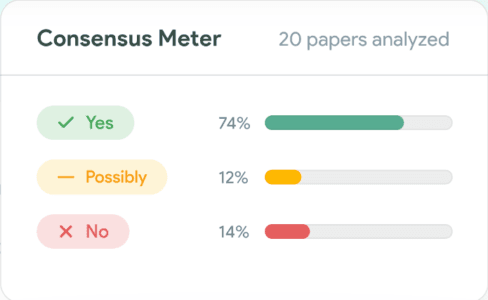
Topic generation:
Feature: Generates unique research topic ideas based on your query.
Example: “Give me research ideas for superhydrophobic antibacterial fabrics.” Consensus generates a list of ideas, such as “nanocomposite coatings for enhanced durability and functionality,” which can be a unique research area for you.
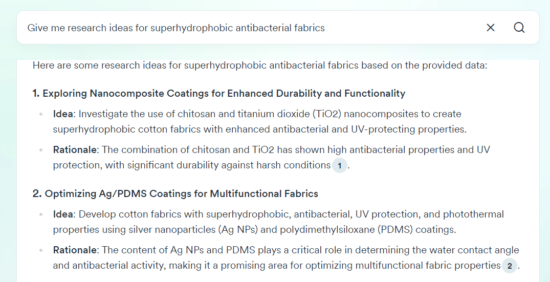
References included:
Feature: Lists the research papers that support its suggestions for further reading.
Example: After asking for research ideas on renewable energy, Consensus lists more papers which you can review further to deepen your research.
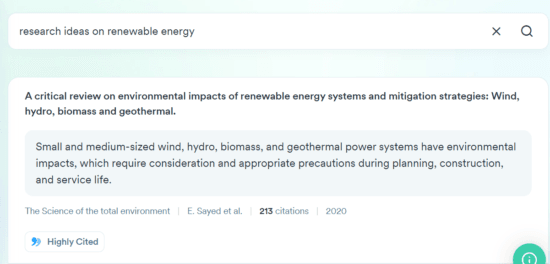
2. Sci Space
AI-Powered Topic Suggestions
Feature: Uses AI to generate personalized research topic suggestions based on keywords or subject areas you input.
Example: Enter “biodegradable plastics” and SciSpace recommends topics like: ” enhancing the mechanical properties of materials like polylactic acid (PLA)”, “Future research should focus on improving biodegradation protocols and integrating bioplastics into the circular economy”
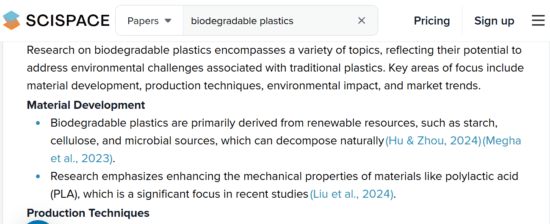
Niche Topic Discovery:
Feature: Helps discover niche or under-explored research areas by analyzing gaps in existing literature.
Example: Input “gene therapy” and SciSpace suggests unexplored angles like: “Techniques such as CRISPR and viral vectors are being developed to correct genetic mutations”, “The concept of “Genoceuticals” is gaining traction, focusing on gene therapies for rare, orphan diseases that currently have no treatment options”.
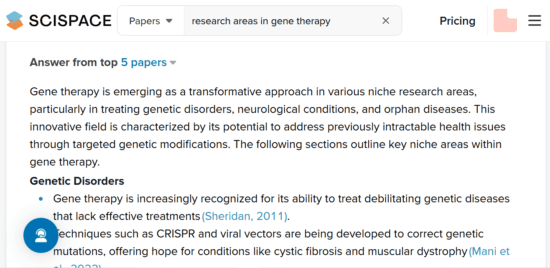
3. Jenni.ai
Research idea generation:
Feature: Generates fresh, unique research ideas within your topic of interest.
Example: Ask Jenni.ai “Give me research ideas for biodegradable plastics in packaging.” It suggests topics which can be an innovative direction for research.

AI chat assistant:
Feature: Offers an AI chat assistant to summarize papers or brainstorm research ideas.
Example: After uploading a paper on machine learning in healthcare, Jenni summarizes key trends, like “personalized AI treatment plans for chronic diseases,” helping you narrow down your research focus.
4. Paperpal
Brainstorming for research ideas:
Feature: Assists with brainstorming unique research ideas in specific areas.
Example: “Give me research ideas for superhydrophobic antibacterial fabrics.” Paperpal generates a list of topics as given below.
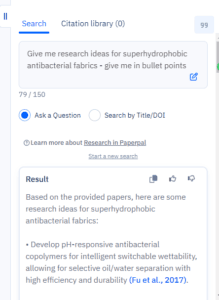
References included:
Feature: Lists the research papers that support its suggestions for further reading.
The screenshot shows the reference papers one can read for the previous example:

Key Tips for Using AI Tools Effectively
Be Specific: To get the best results, narrow down your search to a specific area of interest. Broad queries like “Give me research ideas in nanotechnology” won’t yield useful results.
Read Review Papers First: It’s important to have a basic understanding of the field before using AI tools. This will help refine your research focus.
Validate Your Topic: After generating ideas, make sure to read related papers to confirm the novelty of your chosen topic.
To know more about how to use these AI tools with screen recordings, check out the video below:
If you liked this blog and want to dive deeper into research writing, check out our course, A-Z of Research Paper Writing. Here you will learn everything from selecting a research topic to publishing in top journals, using AI tools to enhance your writing process.
Happy researching! If you have any queries, feel free to comment below and we will try to get back to you at the earliest!




